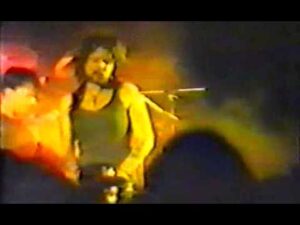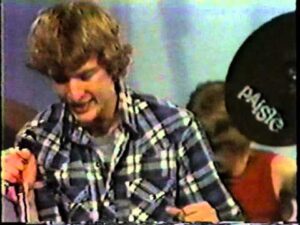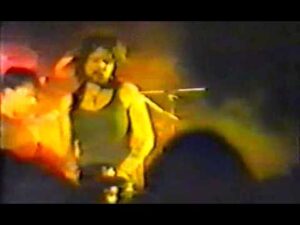Formation & Members
Bérurier Noir, often stylized as Bérurier Noir (ベリュリューズ) to emphasize their unique and international appeal, was formed in Paris, France, in 1983 by Francois Guillemot (known as “Loran”) and Laurent Katrakazos (known as “Fanfan”). Emerging from the vibrant underground punk scene of the time, the band quickly distinguished themselves with an unconventional approach that eschewed traditional rock instrumentation in favor of a more eclectic and raw sound. Initially, the duo used a drum machine instead of a live drummer, which became a signature element of their music.
Over the years, Bérurier Noir’s lineup saw several changes. While Loran remained a constant force on guitar and vocals, other members such as Masto, who handled saxophone duties, and Helno, who contributed to vocals, joined the band at various stages. Despite these changes, the core ethos of the group remained, with a strong emphasis on anti-establishment themes and DIY ethics.
Musical Style & Characteristics
Bérurier Noir’s music is a distinctive blend of punk rock infused with elements of post-punk and hardcore. Their sound is characterized by its frenetic energy, driven by the aggressive guitar riffs of Loran and the relentless drum machine beats that set a hypnotic pace. The inclusion of saxophone added an unexpected layer to their compositions, giving the band a unique edge over their contemporaries.
Lyrically, Bérurier Noir was unapologetically political, addressing issues such as social injustice, anti-capitalism, and the struggles against oppressive systems. Their songs are often anthemic, rallying cries for rebellion and resistance, delivered with an urgency that resonated deeply with their audience. The band’s use of theatrical elements in their performances further illustrated their commitment to creating an immersive and provocative experience.
Key Works & Discography
Bérurier Noir’s discography is a testament to their evolution and impact on the punk scene. Their debut album, “Macadam Massacre” (1983), set the stage for what would become a prolific career, showcasing their raw sound and radical message. As they progressed, albums such as “Concerto pour Détraqués” (1985) and “Abracadaboum” (1987) further established their reputation, featuring tracks that became anthems for the disenfranchised youth of France.
Their live albums, such as “Viva Bertaga” (1989), captured the explosive energy of their concerts, providing a glimpse into the band’s dynamic live presence. Bérurier Noir’s ability to translate their studio sound into a live setting was a crucial aspect of their success, solidifying their status as one of the most influential bands in the French punk scene.
Influence on Other Bands/Scenes
Bérurier Noir’s influence extends far beyond their native France. They played a pivotal role in shaping the French punk and hardcore scenes, inspiring countless bands with their DIY ethos and politically charged lyrics. Their use of non-traditional instrumentation and refusal to conform to mainstream music industry standards resonated with a new wave of punk musicians looking to carve out their own paths.
Internationally, Bérurier Noir’s impact can be seen in the global punk community, where their music and message continue to inspire bands striving for social change. Their ability to address universal themes of oppression and resistance has allowed their music to transcend cultural and linguistic barriers, making them a staple in punk discographies worldwide.
Breakups or Reunions
Despite their success, Bérurier Noir faced internal tensions that ultimately led to their disbandment in 1989. The pressures of maintaining their intense touring schedule and the challenges of staying true to their anti-commercial values took a toll on the band members. However, their breakup did not mark the end of their influence; instead, it cemented their legacy in the punk canon.
In 2003, Bérurier Noir briefly reunited for a series of concerts, much to the delight of their dedicated fanbase. These reunion shows were not just nostalgic trips down memory lane; they were powerful affirmations of the band’s enduring relevance and the timelessness of their message. Although the reunion was short-lived, it reinforced the idea that Bérurier Noir’s music remains as vital today as it was at the height of their career.
Current Reputation & Legacy
Today, Bérurier Noir is remembered as one of the most influential bands in punk history. Their commitment to their ideals and refusal to compromise their artistic vision have earned them a revered place in the annals of punk music. Their discography continues to inspire new generations of musicians and activists, serving as a blueprint for those who seek to use music as a tool for social change.
Bérurier Noir’s legacy is also preserved through various compilations and reissues of their work, ensuring that their music remains accessible to both longtime fans and newcomers alike. The band’s emphasis on authenticity and resistance to commercialization continues to resonate in an era where music is often commodified, reminding us of the power of punk as a form of protest and expression.
Conclusion
Bérurier Noir’s story is one of innovation, defiance, and enduring influence. From their formation in the early 1980s to their brief reunion in the 2000s, the band has left an indelible mark on the punk landscape. Their unique sound, uncompromising message, and dynamic live performances have inspired countless artists and continue to captivate audiences worldwide.
As the punk scene evolves, Bérurier Noir’s legacy serves as a reminder of the genre’s potential to challenge the status quo and inspire change. Their music remains a powerful testament to the enduring spirit of punk, proving that even decades after their inception, Bérurier Noir’s message is as relevant as ever.









